Pegasystems Bundle
How Did Pegasystems Revolutionize Business?
Ever wondered how a chess enthusiast built a tech empire? Pegasystems' story is one of innovation, starting in 1983 with a vision to transform how businesses adapt. From its roots in Cambridge, Massachusetts, Pegasystems SWOT Analysis reveals the strategic moves that shaped its journey. Discover how this company became a leader in enterprise software.
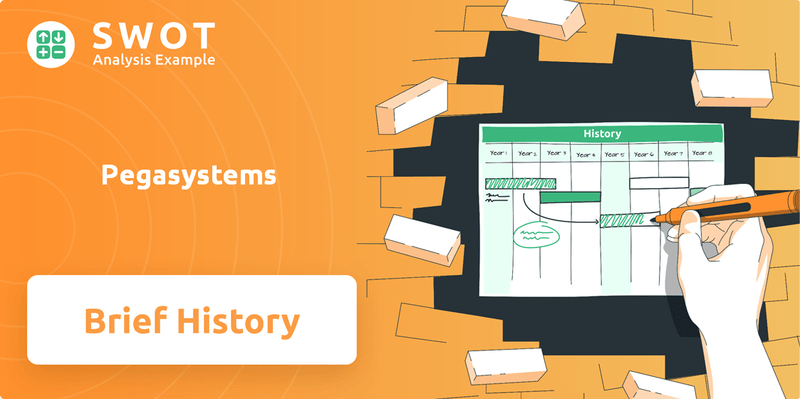
This brief history of Pegasystems explores the company's evolution from a startup to a global software provider. Understanding the Pega history and its founder's early principles provides crucial context. Learn about the key milestones that propelled Pega's growth, its innovative Pega software, and its current market position in the dynamic world of business process management and CRM.
What is the Pegasystems Founding Story?
The genesis of Pegasystems Inc. dates back to 1983. Alan Trefler, the founder, established the company in Cambridge, Massachusetts. Trefler's background in chess, where he achieved a Master rating and co-championed the 1975 World Open Chess Championship, played a significant role in shaping the company's early direction.
Trefler's vision was to bridge the gap between business processes and technology. This led to the creation of model-driven software, now recognized as low-code, aimed at empowering business users. Early on, Pegasystems focused on case management solutions, with American Express as one of its initial clients.
The name 'Pegasystems' was chosen to avoid personal or initial-based branding. The connection to Pegasus, the winged horse from Greek mythology, and its link to the knight chess piece, reflected Trefler's interests. The company was bootstrapped, allowing Trefler to control its growth. The first office was a third-floor walk-up on Main Street in Cambridge. This independent approach and focus on empowering business users were foundational to Pegasystems' early establishment and trajectory. Read more about the Mission, Vision & Core Values of Pegasystems.
Pegasystems' founding was driven by a desire to transform business operations through technology, with a strong emphasis on empowering users.
- Founded in 1983 by Alan Trefler in Cambridge, Massachusetts.
- Focused initially on case management solutions.
- Bootstrapped, allowing for independent growth.
- Named after Pegasus, the winged horse, reflecting Trefler's interests.
Pegasystems SWOT Analysis
- Complete SWOT Breakdown
- Fully Customizable
- Editable in Excel & Word
- Professional Formatting
- Investor-Ready Format
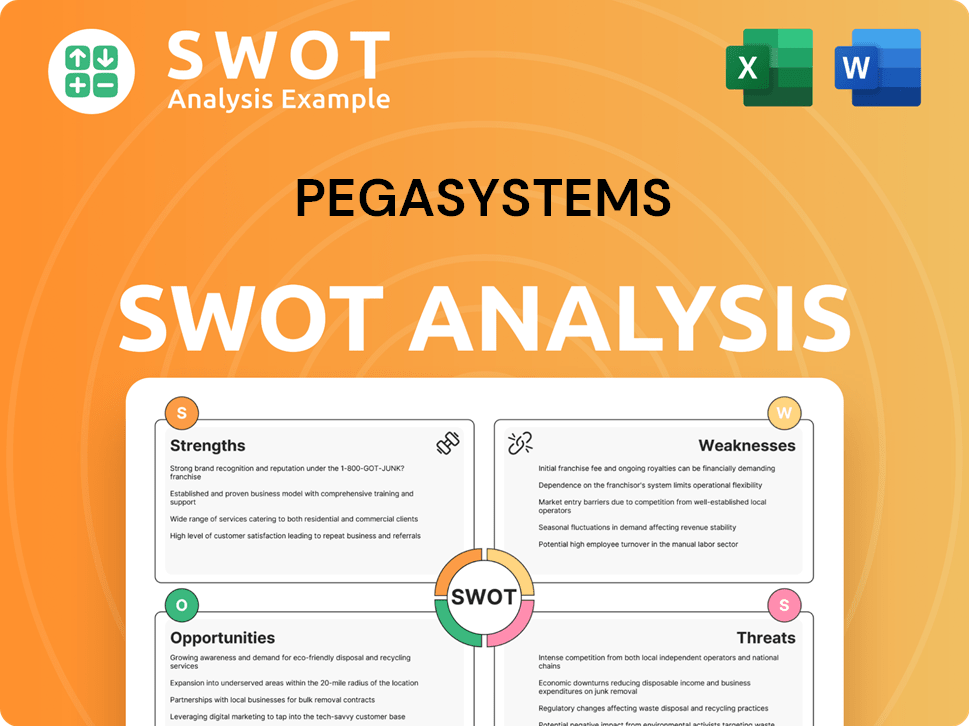
What Drove the Early Growth of Pegasystems?
In its early stages, the company focused on developing its core software for case management, with American Express as an early client. The company's model-driven architecture set it apart, allowing business users to design system behaviors based on their customer engagement needs. This approach enabled the company to evolve from a case management solution provider to a broader customer relationship management (CRM) and business process management (BPM) software company.
A significant milestone in the company's expansion was its decision to go public in 1996, listing on NASDAQ under the symbol PEGA. This move provided capital for further growth and increased its visibility in the software industry. Between 2005 and 2015, the company demonstrated substantial growth, with average sales increasing by 21% per year.
The company strategically expanded its offerings and market reach through a series of acquisitions. In March 2010, the company acquired Chordiant for approximately $161.5 million. Recognizing the shift towards cloud-based solutions, Pega Cloud was introduced in 2012, leveraging Amazon Web Services. These acquisitions and strategic shifts, including the transition to a subscription-based cloud model starting in 2017, have been pivotal in transforming the company's revenue profile and driving growth. For more details on the company's marketing strategies, you can read about the Marketing Strategy of Pegasystems.
As of Q1 2025, Pega Cloud Annual Contract Value (ACV) surged by 23% to $701 million, reflecting the success of this cloud-first strategy. Further acquisitions bolstered its capabilities: Antenna Software, a mobile application developer, was acquired for $27.7 million in October 2013; MeshLabs, a text mining and analytics software startup, in May 2014; and Firefly, a co-browsing tool, in June 2014. The company's headquarters also moved from Cambridge to Waltham, Massachusetts, in 2021.
The early days of the company saw a focus on case management, with a unique model-driven architecture setting it apart. The company's evolution included a public listing in 1996, which fueled further growth. Strategic acquisitions and the shift to cloud-based solutions, particularly with Pega Cloud, have been crucial in shaping the company's trajectory. These strategic moves have positioned the company as a key player in the CRM and BPM sectors.
Pegasystems PESTLE Analysis
- Covers All 6 PESTLE Categories
- No Research Needed – Save Hours of Work
- Built by Experts, Trusted by Consultants
- Instant Download, Ready to Use
- 100% Editable, Fully Customizable
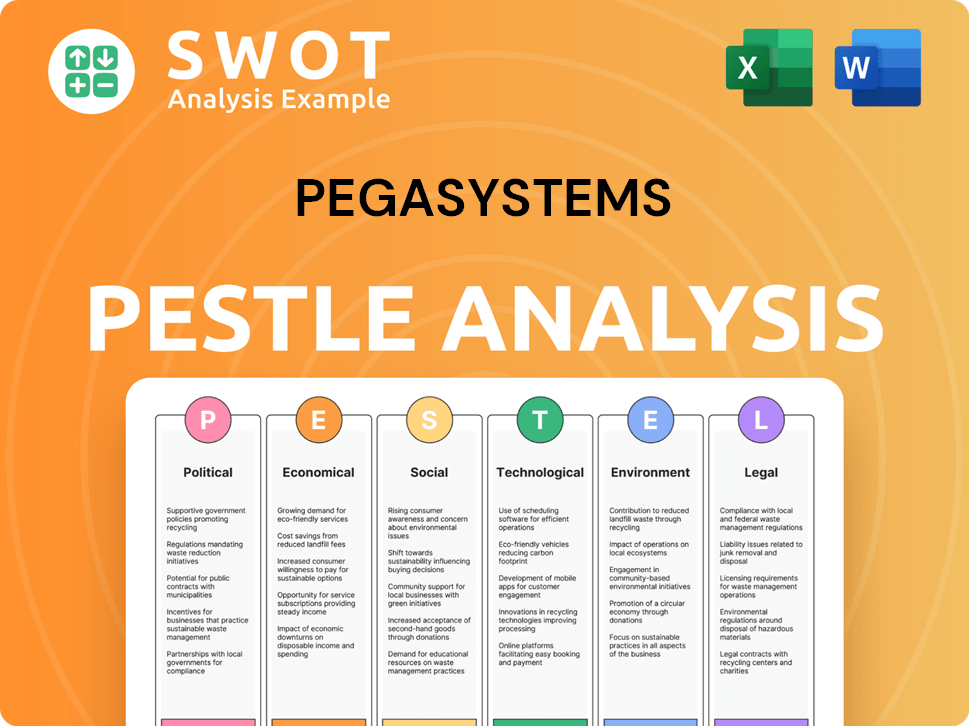
What are the key Milestones in Pegasystems history?
The history of Pegasystems, or Pega, is marked by significant milestones, particularly in AI and automation, shaping its evolution into a leading software provider. From its inception, Pega has continuously innovated, adapting to market demands and technological advancements. Its journey reflects a commitment to technological leadership and strategic growth.
| Year | Milestone |
|---|---|
| Early Days | Founder Alan Trefler's early work on AI agents for chess laid the foundation for the company's future in AI. |
| March 2016 | Pega introduced the Pega Client Lifecycle Management (CLM) application and integrated artificial intelligence into its customer service software. |
| 2018 | Pega's low-code development platform was highlighted in a Wall Street Journal article, and the company released platform additions utilizing AI for marketing campaigns, customer interfaces, and robotic automation, alongside a Blockchain kit for Ethereum. |
| 2023 | Pega launched Pega GenAI, integrating 20 generative AI boosters across its product portfolio, Pega Infinity. |
| April 2024 | Pega launched Pega GenAI Blueprint, a design-as-a-service tool for optimizing application workflow designs with generative AI, having already created over 50,000 blueprints. |
| Q1 2025 | Pega Cloud ACV surged by 23%, indicating strong growth driven by its cloud and AI solutions. |
Pega has consistently focused on innovation, particularly in AI and automation, to enhance its software offerings. Recent advancements include the integration of Pega GenAI across its product suite, providing users with powerful tools to optimize their workflows and customer experiences.
Pega integrated 20 generative AI boosters across its product portfolio, Pega Infinity, in 2023, enhancing capabilities across various applications.
Launched in April 2024, this design-as-a-service tool allows users to optimize application workflow designs with generative AI, having already created over 50,000 blueprints.
Pega has consistently integrated AI into its software, including customer service applications, enhancing automation and customer engagement capabilities.
Pega's low-code development platform has been a key innovation, enabling faster application development and deployment.
Pega released a Blockchain kit for Ethereum, demonstrating its exploration of emerging technologies and their potential applications.
Pega's cloud solutions have seen significant growth, with Pega Cloud ACV surging by 23% in Q1 2025, driven by cloud and AI solutions.
Despite its successes, Pega faces challenges, including intense competition and market volatility. The company must navigate these hurdles while continuing to innovate and maintain its market position. For a deeper understanding of the competitive landscape, explore the Competitors Landscape of Pegasystems.
Pega faces intense competition from established tech giants like Microsoft and ServiceNow, as well as agile startups.
Pega is appealing a jury award of $2.036 billion to Appian Corporation for trade secret misappropriation, which represents a significant financial and legal challenge.
Market volatility and economic uncertainty can impact client spending, potentially leading to longer sales cycles and reduced revenue growth.
Currency fluctuations have affected Pega Cloud revenue, posing a challenge to financial performance.
Pega is focused on strategic initiatives such as its Blueprint strategy for GenAI monetization and balancing growth with profitability.
The company achieved debt-free status in Q1 2025 by repaying $468 million in convertible notes, indicating a focus on financial stability.
Pegasystems Business Model Canvas
- Complete 9-Block Business Model Canvas
- Effortlessly Communicate Your Business Strategy
- Investor-Ready BMC Format
- 100% Editable and Customizable
- Clear and Structured Layout
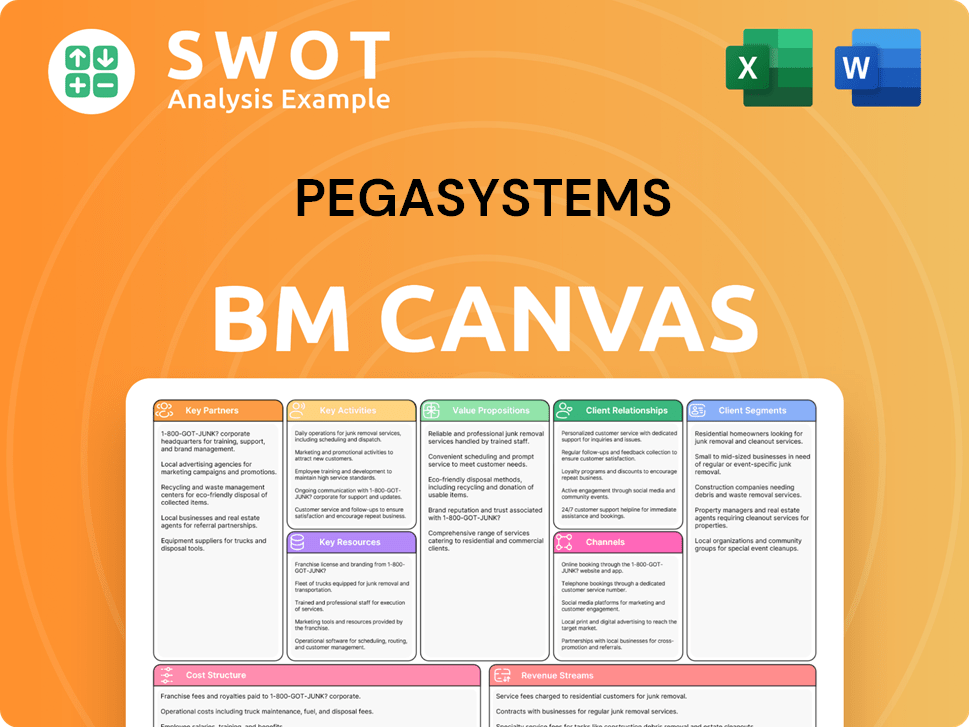
What is the Timeline of Key Events for Pegasystems?
The journey of Pegasystems, a prominent Pega company, began in 1983 when Alan Trefler founded the company in Cambridge, Massachusetts. Over the years, Pegasystems has evolved significantly, marked by strategic acquisitions, technological innovations, and a shift towards cloud-based solutions. The company's history reflects a continuous adaptation to market demands, with an increasing focus on AI and automation to enhance its Pega platform and Pega software offerings.
| Year | Key Event |
|---|---|
| 1983 | Pegasystems is founded by Alan Trefler in Cambridge, Massachusetts. |
| 1996 | Pegasystems becomes a publicly traded company on NASDAQ (PEGA). |
| 2010 | Acquires Chordiant for approximately $161.5 million, expanding into new markets. |
| 2012 | Introduces Pega Cloud, leveraging Amazon Web Services. |
| 2013 | Acquires mobile application developer Antenna Software for $27.7 million. |
| 2014 | Acquires MeshLabs (text mining and analytics) and Firefly (co-browsing tool). |
| 2016 | Launches Pega Client Lifecycle Management (CLM) application and adds AI to customer service software. |
| 2017 | Begins strategic shift from perpetual licenses to a recurring subscription model. |
| 2018 | Releases platform additions utilizing AI for marketing, customer interfaces, robotic automation, and a Blockchain kit. |
| 2019 | Purchases Infruid Labs (business analytics and data visualization) and In The Chat (digital messaging platform). |
| 2021 | Acquires Qurious.io (real-time voice call analysis) and moves headquarters to Waltham, Massachusetts. |
| 2022 | Acquires Everflow (process mining company). |
| 2023 | Integrates Pega GenAI, a set of 20 generative AI boosters, across Pega Infinity. |
| April 2024 | Launches Pega GenAI Blueprint, a design-as-a-service tool. |
| Q1 2025 | Reports strong financial performance, with Pega Cloud ACV surging 23% and achieving debt-free status. |
| June 2025 | Pegasystems Inc. stock is upgraded to a Zacks Rank #1 (Strong Buy). |
Pegasystems is strategically focused on advancing its AI and automation capabilities. The company is integrating AI across its Pega platform to enhance customer service, marketing, and robotic automation solutions. This focus is crucial for driving digital transformation and maintaining a competitive edge in the market.
The Blueprint strategy is expected to unlock significant GenAI monetization potential. The company's design-as-a-service tool, Pega GenAI Blueprint, launched in April 2024, is a key component of this strategy. The company anticipates strong growth in the latter half of 2024 and into 2025 through this initiative.
Pegasystems projects substantial growth in its platform and CRM market, targeting over $130 billion by FY 2027 and exceeding $150 billion by 2029. The company aims for consistent double-digit Annual Contract Value (ACV) growth. The company is targeting $700 million in free cash flow over the next three to five years.
In Q1 2025, Pegasystems reported a 13% year-over-year ACV growth to $1,445 million and a 13% increase in free cash flow to $202 million. Analysts project an EPS of $3.56 for fiscal year 2025. The company plans a two-for-one stock split in June 2025 to enhance liquidity.
Pegasystems Porter's Five Forces Analysis
- Covers All 5 Competitive Forces in Detail
- Structured for Consultants, Students, and Founders
- 100% Editable in Microsoft Word & Excel
- Instant Digital Download – Use Immediately
- Compatible with Mac & PC – Fully Unlocked
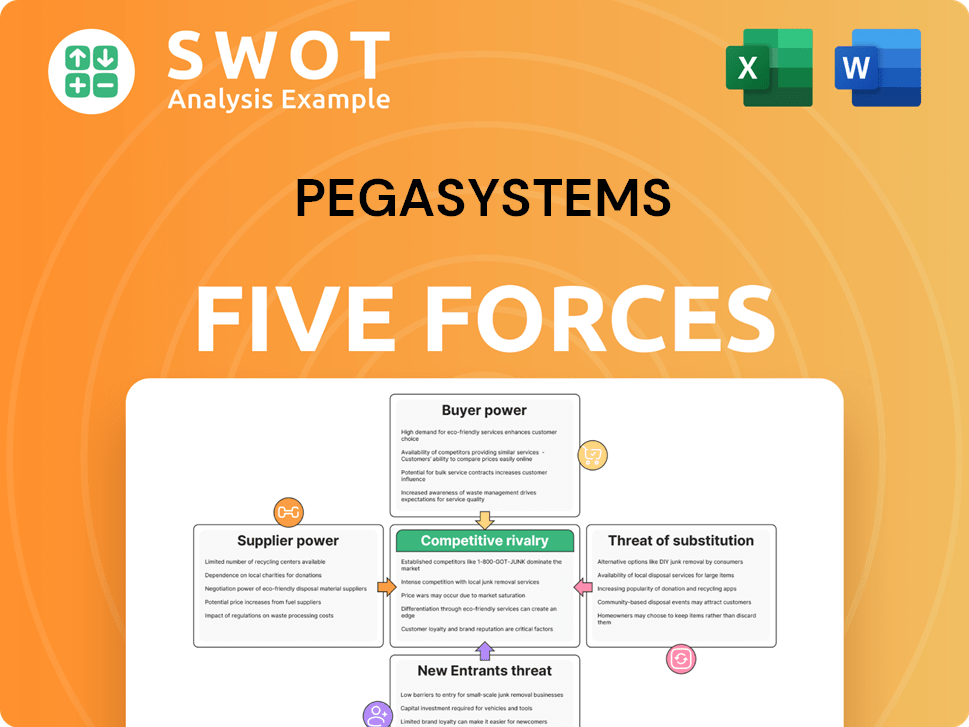
Related Blogs
- What is Competitive Landscape of Pegasystems Company?
- What is Growth Strategy and Future Prospects of Pegasystems Company?
- How Does Pegasystems Company Work?
- What is Sales and Marketing Strategy of Pegasystems Company?
- What is Brief History of Pegasystems Company?
- Who Owns Pegasystems Company?
- What is Customer Demographics and Target Market of Pegasystems Company?
Disclaimer
All information, articles, and product details provided on this website are for general informational and educational purposes only. We do not claim any ownership over, nor do we intend to infringe upon, any trademarks, copyrights, logos, brand names, or other intellectual property mentioned or depicted on this site. Such intellectual property remains the property of its respective owners, and any references here are made solely for identification or informational purposes, without implying any affiliation, endorsement, or partnership.
We make no representations or warranties, express or implied, regarding the accuracy, completeness, or suitability of any content or products presented. Nothing on this website should be construed as legal, tax, investment, financial, medical, or other professional advice. In addition, no part of this site—including articles or product references—constitutes a solicitation, recommendation, endorsement, advertisement, or offer to buy or sell any securities, franchises, or other financial instruments, particularly in jurisdictions where such activity would be unlawful.
All content is of a general nature and may not address the specific circumstances of any individual or entity. It is not a substitute for professional advice or services. Any actions you take based on the information provided here are strictly at your own risk. You accept full responsibility for any decisions or outcomes arising from your use of this website and agree to release us from any liability in connection with your use of, or reliance upon, the content or products found herein.